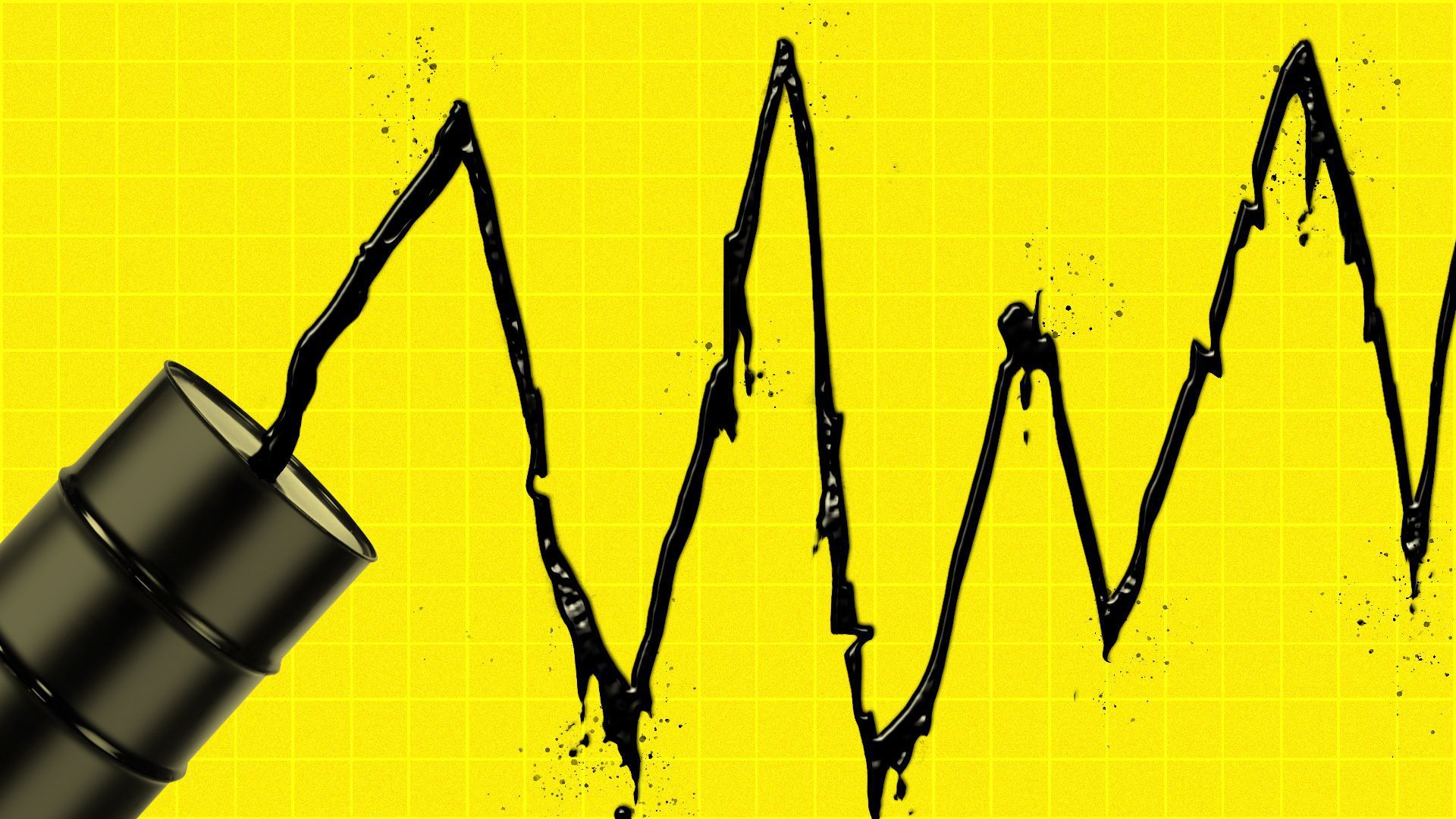| | | | | | | Presented By Upside | | | | Axios Markets | | By Matt Phillips and Emily Peck · Nov 29, 2022 | | 🌅 Good morning, it's a new day filled with more crypto bankruptcy news. 🧩 Before we get into it, we'd like to address the Wordle fans among you. There's something you need to know about last weekend's puzzles, which were intentionally Thanksgiving-themed. Today's newsletter is 1,064 words, 4 minutes. | | | | | | 1 big thing: Still waiting on that energy apocalypse |  | | | Illustration: Shoshana Gordon/Axios | | | | U.S. oil prices briefly fell to their lowest level since 2021 yesterday, as investors braced for a further slowdown in China's economy, Matt writes. Why it matters: The surprising decline in energy prices over the last few months should further ease inflation pressures, potentially setting up the Fed — and other central banks — to slow the interest rate hikes that hammered markets this year. The big picture: Six months back, the world seemed at risk of running dangerously short of oil and gas, due to Russia's attack on Ukraine. Now, oil prices are back to pre-war levels and prices at the pump are falling. - In June, U.S. gasoline prices topped $5 a gallon for the first time. Now they're a bit higher than $3.50.
- Benchmark U.S. crude oil — the West Texas Intermediate futures contract price — was more than $120 a barrel that month, prompting a series of releases from the U.S. Strategic Petroleum Reserve. Now they're almost 40% less, touching sub-$74 levels yesterday before rebounding slightly.
- In Europe, prices for natural gas — which Russia largely supplied — soared to records in August, as nations rushed to stockpile gas supplies for winter. They're down 60% since then.
State of play: The tumble is tied to the situation in China, where drastic COVID-related lockdowns of major urban centers — and a rash of protests in response — have upended the economy, potentially adding to the drag on economic growth this year. - The recent burst of protests against the lockdowns is also adding an unexpected element of political uncertainty.
- Meanwhile, in Europe, governments stockpiled Russian gas while they still could and tapped new sources of liquified natural gas. Conservation efforts cut usage and a lucky stretch of mild weather reduced heating demand. There's likely enough stockpiled to get through the winter now.
- In the U.S., oil prices — tightly tied to expectations of global growth — first slumped as expectations for a recession in Europe, and to a lesser extent, the U.S. itself grew in recent months.
What we're watching: The Dec. 4 meeting of OPEC and its partner Russia in Vienna, and whether the powerful oil cartel will cut production to try to keep oil prices from dropping more. |     | | | | | | 2. Charted: Crude relief |  Data: FactSet; Chart: Axios Visuals Why it matters: Crude oil prices are key inputs into the giant machine that is the U.S. economy, touching both products that are directly petroleum-related — such as chemicals, plastics, fertilizers and fuels — and indirectly impacting a broader swath of the economy through the costs of manufacturing, transportation and heating, Matt writes. - High oil prices are thought to depress the supply of goods by raising the cost of producing them, worsening inflation and weighing on real economic growth.
The bottom line: All else equal, the nearly 40% drop in crude oil prices should help the U.S. economy. |     | | | | | | 3. Catch up quick | | 😱 LME defends nickel market intervention, says it averted $20 billion "death spiral." (Bloomberg) 🚂 Biden calls on Congress to act fast to avoid a rail strike. (Axios) 📱 Apple to lose 6 million iPhone Pros from China plant disruptions. (Bloomberg) |     | | | | | | A message from Upside | | This app is helping users treat themselves | | |  | | | | Upside is on a mission to make sure that, even during expensive times, people still have a little extra money for a rainy day fund. The free app gets users cash back on: - Gas.
- Groceries.
- Convenience stores.
- Restaurants.
On average, users earn $148 annually. Download the free Upside app to start earning. | | | | | | 4. Fired for being no fun (seriously) |  | | | Illustration: Gabriella Turrisi/Axios | | | | Workers can't be fired for being "no fun" in France, an appeals court there ruled earlier this month. Doing so violates their freedom of expression, Emily writes. Why it matters: In the U.S. you could theoretically be fired for being no fun — unless some kind of discrimination was at play. - "There's no freedom of expression in the American workplace," said Susan Crumiller, whose New York-based law firm handles workplace discrimination cases.
Details: The French case dates back to 2015 when a consultant for Cubik Partners in Paris, identified only as Mr. T in the ruling, was dismissed for "professional incompetence," which included his refusal to adhere to the "fun and pro" company values and practices of the company. (H/t to my colleague Kia Kokalitcheva for translating.) - Those practices included social events that involved excessive alcohol consumption and "practices prone to promiscuity," according to the decision.
- In the U.S., claims like these could "constitute a gender-discriminatory hostile work environment," Crumiller said. So, companies couldn't fire you, then, for being no fun, in that scenario.
- If they did, you'd have a reason to sue. Though, that's no fun either.
|     | | |  | | | | If you like this newsletter, your friends may, too! Refer your friends and get free Axios swag when they sign up. | | | | | | | | 5. Crypto's new bankruptcy move: We are not FTX |  | | | Illustration: Annelise Capossela/Axios | | | | If BlockFi is any indication, the new playbook in crypto bankruptcies is all about making sure everyone understands that you are not like FTX. At all. In any way. Not even a little, Axios' Kate Marino writes. Why it matters: FTX's lengthy list of problems — like misuse of customer funds and creating tokens out of thin air to use as loan collateral — have blanketed the entire industry under a cloud of suspicion, and sent customers fleeing. The latest: BlockFi, a crypto lending and trading platform, filed for Chapter 11 bankruptcy yesterday morning. - It blamed its downfall on FTX — and then quickly sought to put as much daylight between it and the disgraced crypto exchange (also bankrupt) as possible.
State of play: Mark Renzi of Berkeley Research Group, BlockFi's financial adviser, took great pains to praise the company's management in his first-day declaration. - "To date, I have not found any failure of corporate controls or systems integrity, and I have found BlockFi's financial information to be trustworthy," Renzi wrote. "BlockFi was forthright about what it would and would not do with funds on its platform—in stark contrast to others reported to have done the opposite."
Context: Remember the jaw-dropping first-day declaration of FTX's John Ray, who described an "unprecedented" failure of corporate controls and a "complete absence" of trustworthy financials? This is the antithesis. - In talking about BlockFi and its management, Renzi sprinkles terms like "prudent stewardship," "knowledgeable and experienced," and "diligent" throughout his sworn statement.
The backstory: Renzi also spells out what led to BlockFi's insolvency — blaming the industry-wide dislocation that he says started with the blowup of the Luna coin and led investors to pull funds from any and all crypto investments. - FTX provided BlockFi a rescue loan earlier this year, quelling BlockFi customer fears (and withdrawals) — until FTX itself collapsed. BlockFi also had assets on FTX's trading platform, now trapped, Renzi says.
The bottom line: FTX will continue to be a potentially debilitating overhang for crypto companies. BlockFi wants to reorganize and emerge from bankruptcy — so further differentiating itself from FTX is one of its top priorities. Go deeper: BlockFi bankruptcy filing claims Alameda defaulted on $680M in loans |     | | | | | | A message from Upside | | How to fight inflation with your everyday spending | | |  | | | | The Upside app pays you back a little from each purchase to help offset rising costs. On average, users earn $148 annually. You can get cash back at: - Gas stations.
- Convenience stores.
- Grocery stores.
- Restaurants.
Take back control of your budget and download the free Upside app. | | | | Was this email forwarded to you? Sign up here to get Axios Markets in your inbox. Today's newsletter was edited by Kate Marino and copy edited by Mickey Meece. |  | | Why stop here? Let's go Pro. | | | | | | Axios thanks our partners for supporting our newsletters. If you're interested in advertising, learn more here.
Sponsorship has no influence on editorial content. Axios, 3100 Clarendon Blvd, Arlington VA 22201 | | | You received this email because you signed up for newsletters from Axios.
Change your preferences or unsubscribe here. | | | Was this email forwarded to you?
Sign up now to get Axios in your inbox. | | | | Follow Axios on social media:    | | | | | |











No comments:
Post a Comment